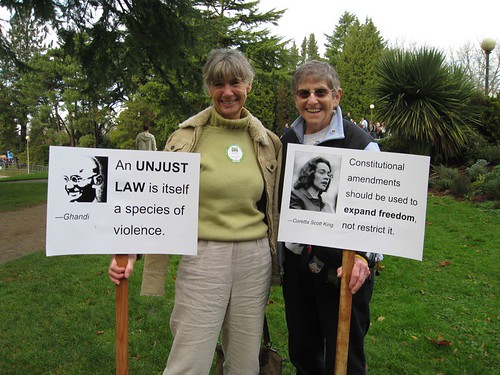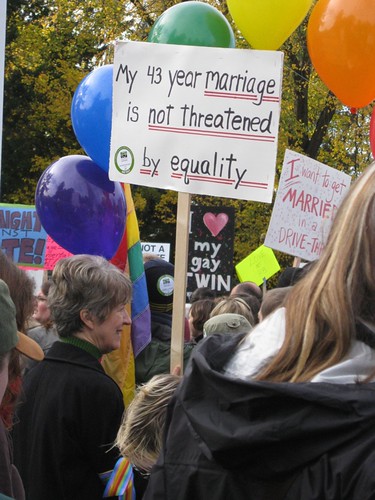
At the urging of a friend, I read the Kennedy decision on Lawrence V. Texas today. This is the decision that overturned the laws making sodomy illegal in 2003. First, it is very readable. There are a few portions that are more technical, but for the most part, it really attempts to speak in plain and respectful language. I wanted to point out the sections that jumped out to me, and honestly, give me a lot of hope for the upcoming Prop 8 and DOMA cases that will be heard this spring. Emphases are all mine.
Kennedy begins by reviewing an earlier case, which upheld the illegality of consenting adults engaging in homosexual acts:
To say that the issue in Bowers was simply the right to engage in certain sexual conduct demeans the claim the individual put forward, just as it would demean a married couple were it to be said marriage is simply about the right to have sexual intercourse. The laws involved in Bowers and here are, to be sure, statutes that purport to do no more than prohibit a particular sexual act. Their penalties and purposes, though, have more far-reaching consequences, touching upon the most private human conduct, sexual behavior, and in the most private of places, the home. The statutes do seek to control a personal relationship that, whether or not entitled to formal recognition in the law, is within the liberty of persons to choose without being punished as criminals.
The decision goes on to quote from Planned Parenthood of Southeastern Pa. v. Casey in addressing the issue of liberty:
“These matters, involving the most intimate and personal choices a person may make in a lifetime, choices central to personal dignity and autonomy, are central to the liberty protected by the Fourteenth Amendment. At the heart of liberty is the right to define one’s own concept of existence, of meaning, of the universe, and of the mystery of human life. Beliefs about these matters could not define the attributes of personhood were they formed under compulsion of the State.” Ibid.
He then refers to Romer v. Evans on equal protection:
Romer invalidated an amendment to Colorado’s constitution which named as a solitary class persons who were homosexuals, lesbians, or bisexual either by “orientation, conduct, practices or relationships,” id., at 624 (internal quotation marks omitted), and deprived them of protection under state antidiscrimination laws. We concluded that the provision was “born of animosity toward the class of persons affected” and further that it had no rational relation to a legitimate governmental purpose. Id., at 634.
He goes on to address the case specifically:
When homosexual conduct is made criminal by the law of the State, that declaration in and of itself is an invitation to subject homosexual persons to discrimination both in the public and in the private spheres. The central holding of Bowers has been brought in question by this case, and it should be addressed. Its continuance as precedent demeans the lives of homosexual persons.
He then concludes:
The case does involve two adults who, with full and mutual consent from each other, engaged in sexual practices common to a homosexual lifestyle. The petitioners are entitled to respect for their private lives. The State cannot demean their existence or control their destiny by making their private sexual conduct a crime. Their right to liberty under the Due Process Clause gives them the full right to engage in their conduct without intervention of the government. “It is a promise of the Constitution that there is a realm of personal liberty which the government may not enter.” Casey, supra, at 847. The Texas statute furthers no legitimate state interest which can justify its intrusion into the personal and private life of the individual.







